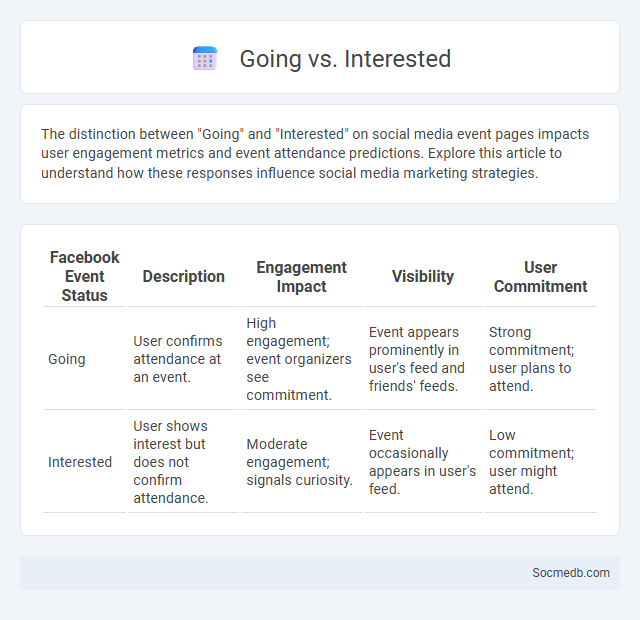
Photo illustration: Going vs Interested
The distinction between "Going" and "Interested" on social media event pages impacts user engagement metrics and event attendance predictions. Explore this article to understand how these responses influence social media marketing strategies.
Table of Comparison
| Facebook Event Status | Description | Engagement Impact | Visibility | User Commitment |
|---|---|---|---|---|
| Going | User confirms attendance at an event. | High engagement; event organizers see commitment. | Event appears prominently in user's feed and friends' feeds. | Strong commitment; user plans to attend. |
| Interested | User shows interest but does not confirm attendance. | Moderate engagement; signals curiosity. | Event occasionally appears in user's feed. | Low commitment; user might attend. |
Understanding Event Engagement: Going, Interested, RSVP
Understanding event engagement on social media involves analyzing the levels of interaction indicated by "Going," "Interested," and "RSVP." These metrics help you gauge audience commitment, predict attendance, and tailor event promotion strategies effectively. Maximizing your event's success relies on interpreting these responses to optimize communication and increase participation rates.
Definitions: What Do Going, Interested, and RSVP Mean?
Going on social media indicates that you have confirmed your attendance at an event, while Interested shows that you might attend but haven't committed yet. RSVP means "Repondez s'il vous plait," a request to respond whether you will participate, helping event organizers plan accordingly. Understanding these terms improves Your event interaction and communication on social platforms.
The Psychology Behind Engagement Choices
Social media engagement is driven by psychological factors such as social validation, fear of missing out (FOMO), and the desire for connection, which shape how users interact with content. Algorithms capitalize on these behaviors by tailoring feeds to maximize your time spent on platforms, increasing likes, comments, and shares. Understanding these psychological triggers can help you make more mindful choices about your social media use.
How Hosts Interpret Going, Interested, and RSVP
Hosts interpret "Going" as a definite commitment, indicating guests plan to attend the event. "Interested" signals curiosity or potential attendance but lacks a firm commitment, helping hosts estimate tentative numbers. Your clear RSVP responses allow hosts to organize resources and seating accurately, ensuring a well-planned gathering.
The Impact on Event Planning and Preparation
Social media has revolutionized event planning by enabling real-time promotion, audience engagement, and feedback collection. Platforms such as Instagram, Facebook, and Twitter facilitate targeted marketing strategies that increase attendance and enhance event visibility. The integration of social media analytics allows planners to optimize logistics and tailor content to audience preferences, improving overall event success.
Social Media Platforms: Features and Button Differences
Social media platforms like Facebook, Instagram, Twitter, and TikTok each offer unique features tailored to diverse user interactions, such as Facebook's detailed relationship status updates and Instagram's focus on visual storytelling through Stories and Reels. Button differences are notable, with Twitter emphasizing the retweet and like buttons for rapid content sharing and engagement, while TikTok features the heart, comment, and share buttons prominently to encourage viral video interaction. These platform-specific functionalities and interface elements optimize user experience and engagement according to their respective social networking goals.
Etiquette: Choosing the Right Response
Choosing the right response on social media is crucial for maintaining positive interactions and protecting your online reputation. Consider the tone, context, and audience before replying to ensure your message is respectful and constructive. Your careful communication fosters trust and encourages meaningful engagement across platforms.
Tracking Attendance: Why Accurate Responses Matter
Accurate tracking of attendance on social media platforms helps ensure reliable data for evaluating event reach and engagement metrics. Your ability to gather precise attendee responses enables better planning, resource allocation, and targeted marketing efforts. These insights improve overall event performance and contribute to building a loyal and active online community.
Leveraging Engagement Data for Better Events
Leveraging engagement data from social media platforms enables you to tailor your events to audience preferences, boosting attendance and satisfaction. Analyzing metrics such as likes, shares, comments, and post reach reveals insights into what content resonates, helping optimize event themes and promotion strategies. Real-time engagement tracking during events enhances interaction opportunities, fostering stronger connections and driving long-term loyalty.
Best Practices for Event Organizers and Attendees
Event organizers should leverage targeted hashtags, real-time updates, and interactive content to enhance engagement and maximize event visibility on social media. Attendees can amplify event impact by sharing authentic experiences, tagging event profiles, and participating in event-related online discussions. Utilizing analytics tools helps organizers track engagement metrics and refine social media strategies for future events.
 socmedb.com
socmedb.com